We’ve all heard the factoid passed around the dog park: “A dog’s mouth is cleaner than a human’s is.
But how accurate is it really?
With many of us puckering up to our pups, it’s vital to know the truth about this mouthy matter.
Below, we’ll share if a dog’s mouth is cleaner than a human’s and explain everything you need to know about doggo dental hygiene.
Key Takeaways: Are Dog Mouths Cleaner Than Human Mouths?
- A dog’s mouth is not cleaner than a human’s. They aren’t necessarily dirtier than human mouths, either — they just have different bacteria growing in their mouths than we do.
- Kissing a poop-eating pup isn’t recommended. Some dogs certainly have cleaner mouths than others, and poop eaters aren’t bringing home any awards for cleanest mouth anytime soon.
- Regular dental care keeps your dog’s mouth cleaner. While your dog’s mouth might not be cleaner than yours, you can keep it in peak condition by keeping up on maintenance, including toothbrushing, exams, and deep cleanings.
Is a Dog’s Mouth Cleaner Than a Human’s Mouth?
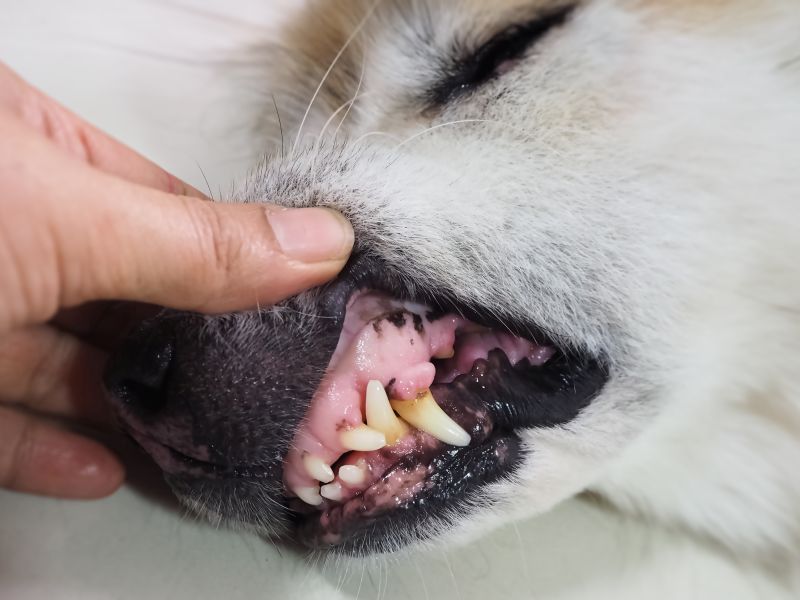
We hate to be the bearer of bad news, but your dog’s mouth is just as dirty as yours is.
Both humans and canines have mouths loaded with microbes and bacteria that fluctuate based on dental care and diet.
Estimates of the number of species present in human and canine mouths differ based on the source consulted, though they all tend to agree that people and their pups have roughly the same number of bacterial taxa present.
For example, the AKC reports that we both have about 600 kinds of microorganisms hanging out in our oral cavities. However, a 2012 study published in PLoS One places the figure quite a bit higher for four-footers and two-footers alike, stating that:
While the current study provides good initial coverage of the canine oral microbiome, the oral samples examined were limited to the subgingival sites. Further studies sampling other oral habitats such as teeth, tongue, cheek, hard and soft palates, and tonsils will no doubt expand the number of canine taxa to approach the more than 1,000 currently defined for the human oral microbiome.
Whichever number you prefer, it’s pretty obvious that we both have roughly equally filthy mouths.
Our species share a few bacteria types but differ with the most prevalent kind found in each species. For example, while our mouths contain the bacteria Porphyromonas gingivitis (the primary one responsible for tooth and gum disease), dogs have Porphyromonas gulae to contend with.
Dogs may have other serious bacteria hiding in their mouths depending on their diet and habits, with poo eaters housing some seriously nasty ones.
Can Your Dog’s Mouth Germs Get You Sick?
The bacteria typically found in a dog’s mouth probably won’t cause illness, as they’re not zoonotic — which means that they can’t spread from animals to humans.
That said, your dog might have some strange bacteria in there that he’s picked up from dining on trash, eating another dog’s poop, or chowing down on dead animals.
As you’ve no doubt noticed, your dog probably lives by a “lick first, ask questions later,” mantra, so it’s no wonder weird cooties end up in his mouth.
And some of the bacteria picked up from these sources can make you seriously sick. Some of these are zoonotic, and some may even be able to evade your immune system’s defenses.
Should You Let Your Dog Kiss You?

For most healthy adult humans, dog kisses are likely fine. Or at least, unlikely to lead to serious illness.
But this answer teeters into no territory if you have an unabashed poop eater of a pup. It’s also a bad idea to smooch dogs who frequently lick, chew, or mouth things they shouldn’t like garbage, tampons, etc.
Does your dog frequently visit the cat’s litter box for a snack? Did he just spend five minutes licking his butt? Did you just have to stop him from drinking out of the toilet?
Yeah, you may want to skip the smooches.
Those most at risk of infection are better off abstaining from canine kisses just to be safe. This includes children, elderly owners, and anyone who has a compromised immune system.
Will Your Dog’s Saliva Heal Wounds?
Another common bit of folk wisdom contends that dog saliva can help heal wounds. But is that really true or is it like the clean mouth thing?
Unfortunately, it’s the latter.
Your dog’s saliva is not sterile and should not be allowed around wounds.
In fact, letting your dog lick an open wound (on you or him) can lead to a nasty infection. This is why dogs are often outfitted with an Elizabethan collar by vets to prevent licking injuries or surgery sites.
The Importance of Dog Oral Health
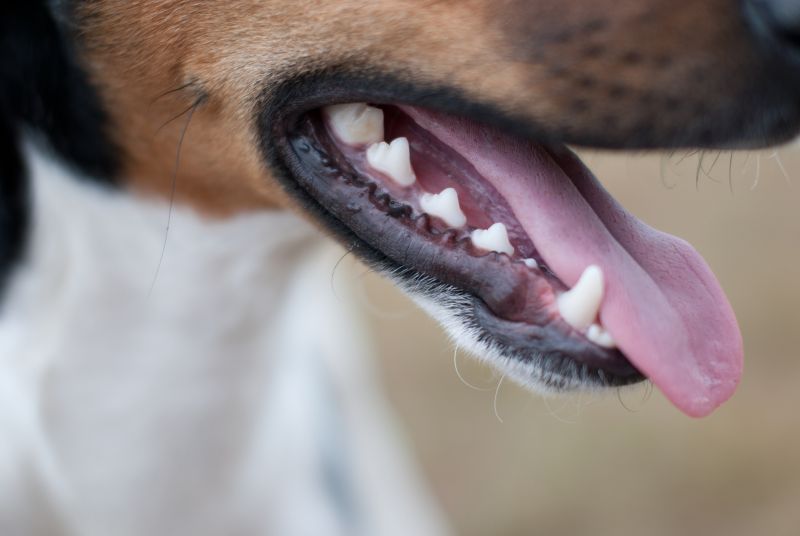
Sadly, despite being one of the most important areas of canine health, oral hygiene is often overlooked, with up to 80 percent of all dogs having periodontal disease by age three.
Yes, toothbrushing can be a little weird at first for you and your dog, but the long-term benefits are well worth the time. Like us humans, dog dental issues are more than just smelly — they’re dangerous.
If left untreated, canine dental problems can lead to:
- Pain: No one wants to see a dog in pain, and as we all know, toothaches can be more than ouchy. This can lead to hesitancy to eat, restlessness, and irritability in your best buddy.
- Widespread infection: Tooth infections and abscesses are no joke, capable of causing body-wide issues. Abscesses are incredibly painful and can cause severe facial swelling, affecting vision.
- Organ damage: Dental bacteria buildup can affect the heart, liver, and kidneys, possibly causing organ failure over time. Endocarditis is a particularly troublesome complication to watch for as well.
- Bone breakdown: Severe tooth decay can spread into surrounding bone, leading to infection and potential jaw fractures.
- Tooth loss: As infection spreads and sockets loosen, your dog’s teeth may start to fall out. Losing teeth affects your pup’s diet over time, requiring softened food and increased dental care to protect remaining teeth.
Thankfully, you can fight back against tooth decay and other oral issues by implementing a few things in your doggo’s routine, including:
- Regular toothbrushing: Brushing your dog’s teeth can be a little awkward initially, but over time, most dogs learn to tolerate it as well as other necessary but annoying activities, like nail trims and ear cleanings. For best results, start practicing with toothbrushing in early puppyhood and use a tasty flavored dog-friendly toothpaste. If you struggle due to your dog’s reluctance or aggression, don’t force it. Ask your vet for possible alternatives to keep you safe.
- Home checks: If your four-footer tolerates it, take a good look in his mouth before and after toothbrushing. You want to not only pay attention to his teeth to check for anything loose or cracked but also note his gum and tongue color and any smells that are present. Does your dog have bad breathl? Fishy? Sweet? Are his gums pale? If something is off, report it to your vet. Not only can these be signs of dental problems, but they can also be a symptom of an overall health condition, like diabetes or liver disease.
- Annual exams: Your vet will check out your dog’s mouth during exams, noting any potential oral issues before they worsen and become harder (and more expensive) to treat. This can include tartar buildup and gum disease, retained teeth in puppyhood, or loose teeth over time.
- Dental chews: Chewing helps wear away harmful tooth buildup, helping freshen your pup’s breath and keep his teeth looking and feeling their best. As with any pupper product, made-in-the-USA dog dental chew options are best.
- Crunchy food: Kibble can help prevent some dental buildup with its crunchy texture. While wet food is tasty, it doesn’t offer much resistance when chewed, allowing gunky plaque to coat and remain on teeth.
- Deep cleaning: Sometimes, a deep cleaning by your veterinarian is necessary to scrape away tartar and address other dental problems while your dog is sedated. Deep dog teeth cleanings can be expensive, but they are vital for saving teeth as your dog ages. If necessary, your vet may also remove cracked or rotted teeth, letting your pup eat comfortably and live a longer, healthier life.
During your dog’s annual exam, ask about any dental recommendations your vet may have. Some dogs benefit from some interventions more than others. Even dogs without teeth need oral care too, so remember to keep up on those checkups!
Common Signs of Canine Mouth Problems
While we can speak up when we’re having tooth pain, dogs aren’t so lucky. You’re not totally in the dark about his dental health, however, as there are several signs to look for that could mean trouble, including:
- Excessive drooling
- Bad breath
- Chipped or broken teeth
- Loose teeth
- Discolored teeth
- Gum discoloration
- Hesitancy to eat
- Bleeding gums
- Swollen gums
If you notice any of these, give your veterinarian a call to schedule a thorough exam. Addressing problems early can save you heaps of money and heartbreak.
***
While dogs’ mouths aren’t cleaner than ours, we still love them just the same. You’re more than welcome to share water or ice cream with yours if you see fit. In fact, go ahead and pucker up for a kiss if you’d like.
Just remember to be mindful of your pooch’s habits and your own health. You might be better suited going for belly rubs in the end.
Do you kiss your dog? Have advice for keeping a dog’s teefers in tip-top shape? Let us know in the comments!
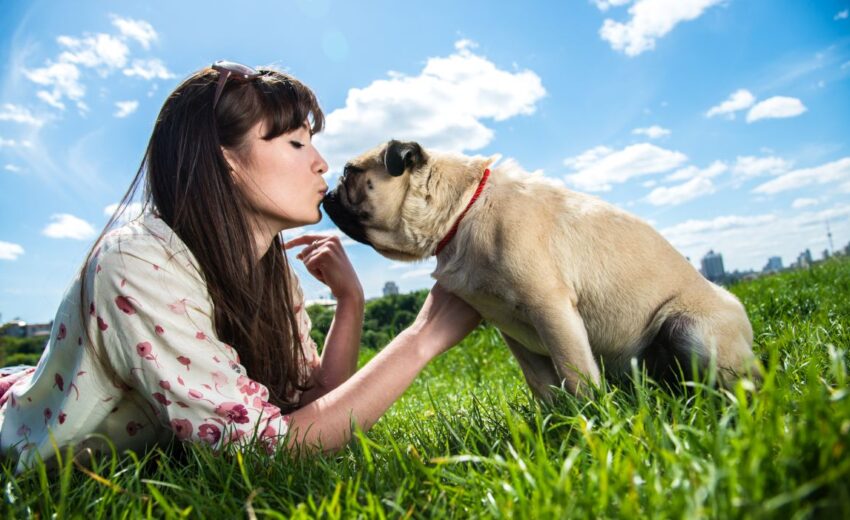

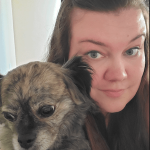


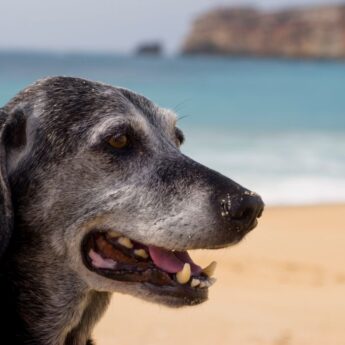

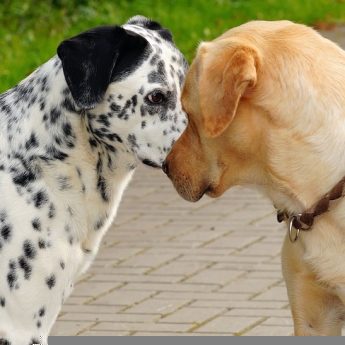
No Comments